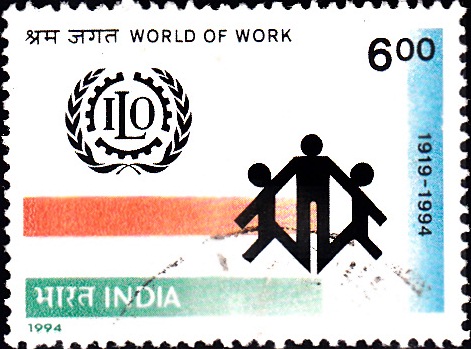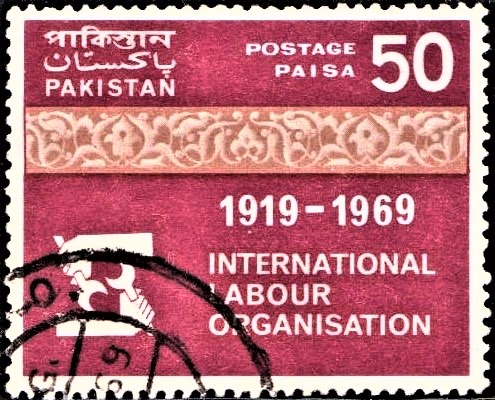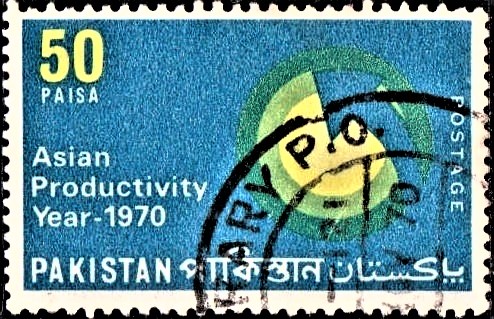
India on International Labour Organization 1969
A commemorative postage stamp on the 50th Anniversary of the International Labor Organisation (ILO), a United Nations agency to advance social justice and promote decent work by setting international labour standards :
 Issued by India
Issued by India
Issued on Apr 11, 1969
Issued for : The Posts and Telegraphs Department is happy to bring out a special postage stamp to commemorate the 50th anniversary of this great world organisation whose activities are of great significance to India and other Asian countries.
Description of Design : The design of the stamp is horizontal and depicts an I.L.O. emblem at the left side in triangle on Silhouette background of big letters “I.L.O.” At the right side two hands are shown with spanners in action on the background of the Globe.
Type : Stamp, Postal Used
Colour : Mineral Red
Denomination : 20 Paise
Overall Size : 4.06 X 2.28 cms.
Printing Size : 3.80 X 2.00 cms.
Perforation : 14 x 14½
Watermark : Printed on unwatermarked paper
Number Printed : 30,00,000
Number per issue Sheet : 50
Printing Process : Photogravure
Designed and Printed at : India Security Press
About :
- Fifty years ago, when the First World War was drawing to a close, not only was peace sought after, but the world wanted a durable peace. The Peace Treaty signed in Versailles on 28th June, 1919, set up the League of Nations whose essential purpose was to avoid future conflicts. But it had already been understood that universal and lasting peace “can be established only if it is based upon social justice.” The International Labour Organisation was, therefore, ushered into existence alongwith the League of Nations and charged with the responsibility of organising international collaboration for the study of labour problems and for the adoption of international standards of workers’ protection.
- The ILO which observes its 50th Anniversary this year, was established in 1919 to promote social justice and improve working and living conditions throughout the world. Most of the Asian countries are now members of the ILO. With the increase in the number of Asian countries joining the ILO over the years, the Organisation’s concern with Asia has grown considerably. The opening of the Asian regional office in 1966, is further evidence of this growing concern.
- For years after it came into being, the ILO remained an institution for standard-setting and a clearing house of information on labour matters; but in later years, there was a gradual shift in the Organisation’s work from standard-setting to operational activities. ILO is wedded to the policy of bringing governments, employers and trade unions together for united action in the cause of social justice and higher living standards everywhere. It is an inter-governmental agency, but the tripartite principle applies to all its councils. The membership of the Organisation stands, at present, at 118, as against 45 originally.
- The aims and purposes of the ILO are based on the Declaration of Philadelphia adopted in 1944. The Declaration of Philadelphia is a reaffirmation of the principles on which the Organisation was originally based and declares that “labour is not a commodity; that freedom of expression and of association are essential to sustain progress; that poverty anywhere constitutes a danger to prosperity everywhere and that the war against want requires to be carried on with unrelenting vigour within each nation and by continuous and concerted international effort in which the representatives of workers and employers, enjoying equal status with those of Governments, join with them in free discussion and democratic decision for the promotion of common welfare.” It also asserts primacy of the social objective of international policy, i.e., “the attainment of conditions in which all human beings irrespective of race, creed or sex have the right to pursue both their material well-being and their spiritual development in conditions of freedom and dignity, of economic security and equal opportunity.“
- The year 1969 was a memorable one for India which has been a founder-member of the ILO since its inception and for the other Asian countries, as the year will see initiation by the ILO of a World Employment Programme and as part of this programme, the ILO is committed to a massive undertaking to help in the formation of the Asian Man-power Plan, which will develop the regions’ human resources and co-ordinate national plans in an integrated regional whole. The framework of the Plan when approved by the Asian Advisory Committee at Singapore in 1966 was hailed as “dynamic and positive concept“.
- The International Labour Organisation was celebrating its 50th anniversary this year and it is a happy coincidence that the celebrations fall in the Gandhi Centenary Year. Gandhiji‘s views on social justice, equality of opportunities and dignity of labour and the sanctity of human rights are well known.








[…] Indian Labour (1929-30). Between 1922 and 1948, he frequently represented Indian Labour at at the International Labour Organisation Conferences. He was Chairman of the Labour Sub-Committee of the Indian National Planning Commission […]
[…] led the Indian Food and Agriculture delegation to Nepal and also the Indian delegation of I.L.O. in Canada and Switzerland. He also actively led a large number of Government and voluntary […]
[…] and has stood for constitutional, statutory and developmental measures to combat child labour. Six ILO conventions relating to child labour have been ratified, three of these as early as the first […]